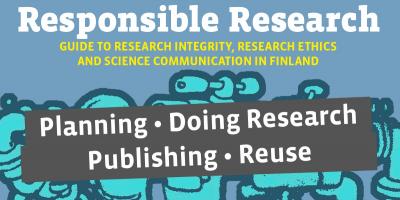The responsible researcher and responsible research should operate in interaction with the rest of society.
Tense debate sometimes arises regarding the position of researchers in relation to the public sphere and the use of research findings outside the scientific community. Should a researcher present interpretations of the practical significance and application of their research findings in public? Does research lose its objectivity and credibility if it is expected to produce model solutions to social questions? Is it not the job of a researcher conducting basic research in particular to remain in the role of researcher and concentrate on their scientific findings?
The position of international science organisations
The Council of Finnish Academies represents all the science academies operating in Finland (the Finnish Society of Sciences and Letters, the Finnish Academy of Science and Letters, the Finnish Academy of Technical Sciences, and the Swedish Academy of Engineering Science in Finland) in several international science organisations. The international organisations typically see the scientific quality and social impact of research more as mutually complementary rather than competitive factors or as characteristics that reduce each other’s credibility. For example, the mission of the International Council for Science (ICSU), “to strengthen international science for the benefit of society”, seamlessly links the prerequisites for carrying out science and the quality of research with social development. From this viewpoint, the responsible researcher and responsible research should operate in interaction with the rest of society.
Science Advice for Policy by European Academies, SAPEA
International science and benefit to society are currently brought together in the SAPEA project (Science Advice for Policy by European Academies). SAPEA was granted four-year funding under the Horizon 2020 programme, which it used from December 2016. The project is included as an official part of the European Commission Science Advice Mechanism. There is a consortium responsible for the project comprising five science academies: European Academies’ Science Advisory Council EASAC, All European Academies ALLEA, European Council of Academies of Applied Sciences, Technologies and Engineering Euro-CASE, Federation of European Academies of Medicine FEAM and Academia Europaea.
The task of individual researchers participating in the science advice system is to offer high-level scientific expertise to support the work of political decision-makers, not to make science policy or to participate in political decision-making themselves.
The original intention of the SAPEA project is to produce timely, independent and evidence-based scientific information to support political decision-making. The project brings together more than a hundred European science academies, with their members and national networks. The task of individual researchers participating in the science advice system is to offer high-level scientific expertise to support the work of political decision-makers, not to make science policy or to participate in political decision-making themselves. SAPEA’s work is based on responsible research conducted on the principles of scientific independence and the right of self-determination. Questions to be worked on are chosen on the one hand from topics proposed by the scientific community itself and on the basis of information needs proposed by the European Commission on the other. To respond to each question tackled, working groups are set up comprising representatives of different disciplines by making use of the project’s academy networks. The project does not provide rapid science advice in the space of a few days or weeks but concentrates on medium-term advice based on broad analysis.
In practice, the SAPEA project brings requests for information to national science academies and the most suitable potential experts are sought from the research community to respond to them. In Finland, scientists willing to participate and commit themselves have been quickly found. I consider this an indication that researchers consider scientific science advice to be their natural responsibility and secondly to also form an interesting part of the work of a researcher as a whole.
Päivi Tikka is Acting Managing Director of the Council of Finnish Foundations and worked as the secretary general of the Council of Finnish Academies
Further information:
Council of Finnish Academies: http://www.academies.fi/en/
SAPEA: http://www.allea.org/asap-academies-sciences-advice-to-policy/
SAM: https://ec.europa.eu/research/sam/index.cfm
You might also be interested in
Tämä teos on lisensoitu Creative Commons Nimeä 4.0 Kansainvälinen -lisenssillä. Detta verk är licensierat under en Creative Commons Erkännande 4.0 Licens. This work is licensed under a Creative Commons Attribution 4.0 International license.
